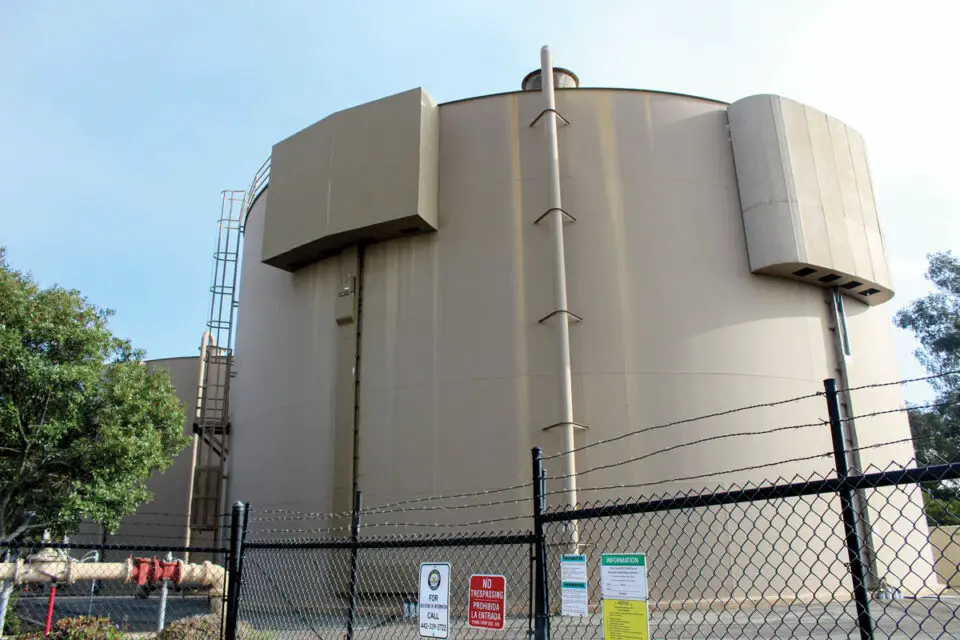CARLSBAD — The city of Carlsbad continues to work toward completing the third phase of its recycled water program, which includes the construction of a new recycled water storage tank near the corner of Black Rail Road and Poinsettia Lane.
The new facility will increase the city’s recycled water storage capacity, helping to ensure a reliable water source for irrigation, according to the city.
The current site holds three similar storage tanks and a recycled water pump station, with a new tank being built adjacent to the larger of the three existing tanks.
“The new tank will hold up to 1.5 million gallons, with the larger tank holding up to 8.5 million gallons. The dimensions of the new tank will be 85.5 feet in diameter and 40 feet high,” the city said.
Construction is scheduled from September 2023 through fall 2024, and work hours will generally be Monday through Friday, 7 a.m. to 4 p.m., except for city holidays.
Noise from construction equipment and grading can be expected, but no interruptions to water or sewer service are anticipated, and the city said it would provide advanced notice if any planned interruptions are needed.
Additionally, landscape improvements will be constructed near the southern and eastern areas of the property to partially screen the reservoir from view.
Carlsbad has long been a leader in recycled water, desalination and water conservation. The new reservoir has been planned since 2012 as part of the city’s efforts to increase recycled water capacity.
The current site has been in use for nearly 40 years and currently includes a recycled water pump station and three existing water storage tanks.
Recycled water stored at this new reservoir will be used to irrigate landscaping in street medians, city parks and homeowners association common areas throughout neighborhoods in Carlsbad.
Recycled water is becoming increasingly important as a sustainable water source for irrigation or other non-drinking uses. Each gallon of recycled water used for irrigation saves a gallon of drinking water, and it is about 16% cheaper than a gallon of potable water because the city controls the production, according to the city.
Although recycled water is a highly treated product, it is not treated to the same standards as drinking water delivered to homes and businesses. For this reason, conditions for using recycled water have been established. Recycled water is not suitable for drinking, according to a statement from the city.
Carlsbad has approximately 97 miles of recycled distribution pipeline. According to the city, this distribution system currently supplies more than 1,000 recycled points of connection.
The sites served by recycled water include La Costa Golf Course, Park Hyatt Resort and Golf Course, The Crossings at Carlsbad Golf Course, Legoland California, Grand Pacific Palisades Hotel and Karl Strauss Brewery.
Recycled water distributed by the water district is supplied by two sources, namely the Meadowlark Treatment Plant, owned and operated by the Vallecitos Water District, and the Carlsbad Water Recycling Facility, owned by the Carlsbad Municipal Water District and operated by the Encina Wastewater Authority.
Recycled water is also supplied to many of Carlsbad’s parks, median strips, shopping areas and freeway landscaping. Carlsbad has also embraced the desalination process and water conservation.
The Claude “Bud” Lewis Carlsbad Desalination Plant is the largest seawater desalination plant in the nation. The plant delivers nearly 50 million gallons of desalinated water to San Diego County daily and serves approximately 400,000 people throughout the county.
“Carlsbad city leaders have been actively involved in water issues, recognizing the critical link between a reliable water supply and our quality of life and economy. We were heavily involved in making the desalination plant a reality, which today provides about 10% of the region’s water supply,” the city said.
The desalination plant also provides the city of Carlsbad and San Diego County water agencies with complete control of a local drinking water supply that is not dependent on local rainfall, snowpack in the Sierras or outside suppliers.
“Local rainfall isn’t going to solve our water supply challenges. Most of our water supply comes from Northern California and the Colorado River,” the city said.
The plant is also south of the major Southern California fault lines, providing added water supply security in case an earthquake severs imported water supply lines.
“The water leaving the Carlsbad Desalination Plant is the highest quality water in the county,” according to a statement from the plant.




